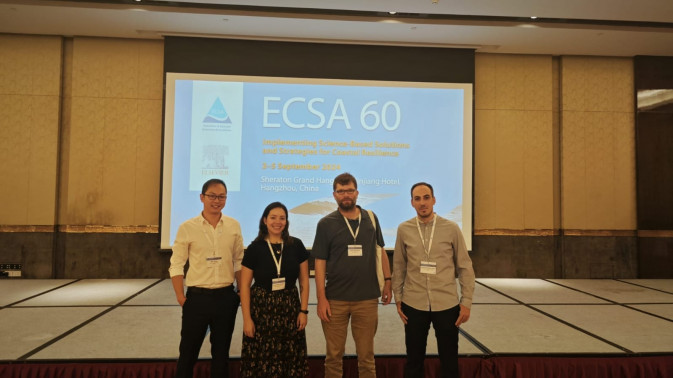
Project partners discuss "Science-Based Solutions and Strategies for Coastal Resilience" at ECSA 60
The 60th Estuarine & Coastal Sciences Association (ECSA) conference occurred from 2 to 5 September 2024 in Hangzhou, China. Centred around the theme "Implementing Science-Based Solutions and Strategies for Coastal Resilience," the event was hosted by the State Key Laboratory of Satellite Ocean Environment Dynamics and brought together global experts to tackle the critical challenges facing coastal ecosystems in the Anthropocene.
REST-COAST took part in the ECSA conference through a session chaired by Wei Chen, a project partner from Hereon. The session focused on the increasing vulnerability of estuaries and deltas—key coastal zones that provide vital habitats and economic value. These regions are facing growing pressures from human activities such as land reclamation, shipping, and construction, exacerbated by climate change impacts like sea-level rise. The session explored how nature-based solutions (NBS) can offer a low-carbon approach to disaster risk reduction while promoting sustainability, resilience, and resistance in these threatened coastal ecosystems.
Luciana Villa, also from Hereon, presented recent work from the Wadden Sea pilot case, highlighting Nature-Based Solutions: Harnessing the Coastal Protection Potential of Seagrass in Jade Bay. Additionally, Xavier Sánchez-Artús from UPC discussed managing barrier beaches using NBS, with a focus on Trabucador Beach in Spain.
The session showcased the latest advances in NBS, emphasising the need for upscaled restoration efforts in estuarine and deltaic systems to safeguard their essential functions. Comparisons were drawn between NBS and traditional engineering approaches, aligning with initiatives such as REST-COAST.
Overall the conference underlined the critical importance of science-based strategies to enhance resilience in coastal zones and called for innovative solutions to address challenges like coastal erosion, flooding, and water quality while tackling both short-term extreme events and long-term climate trends.
Learn more about the different sessions that took place at the conference here.